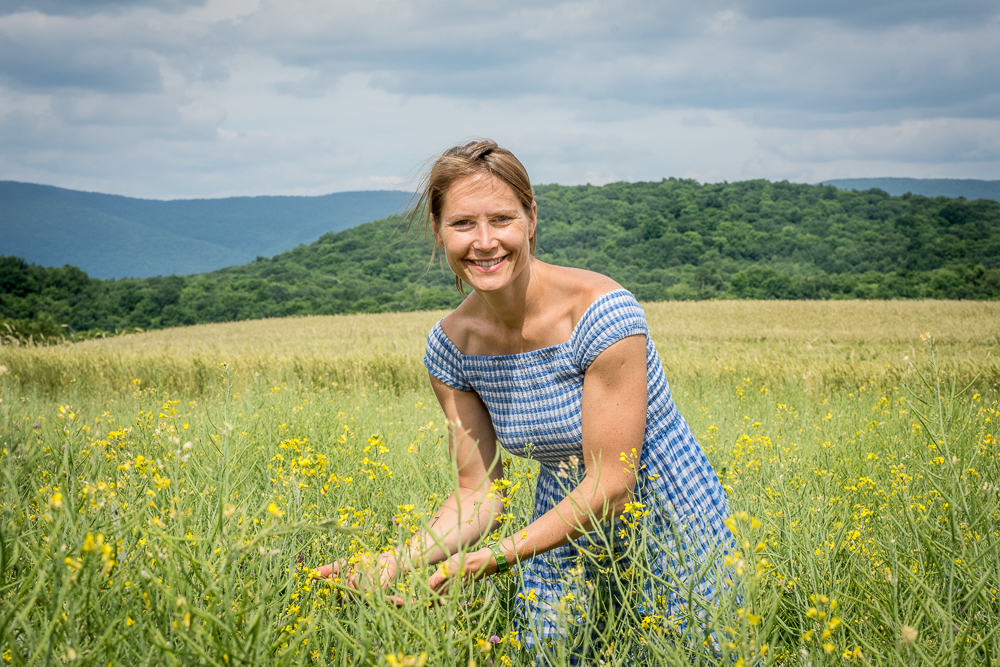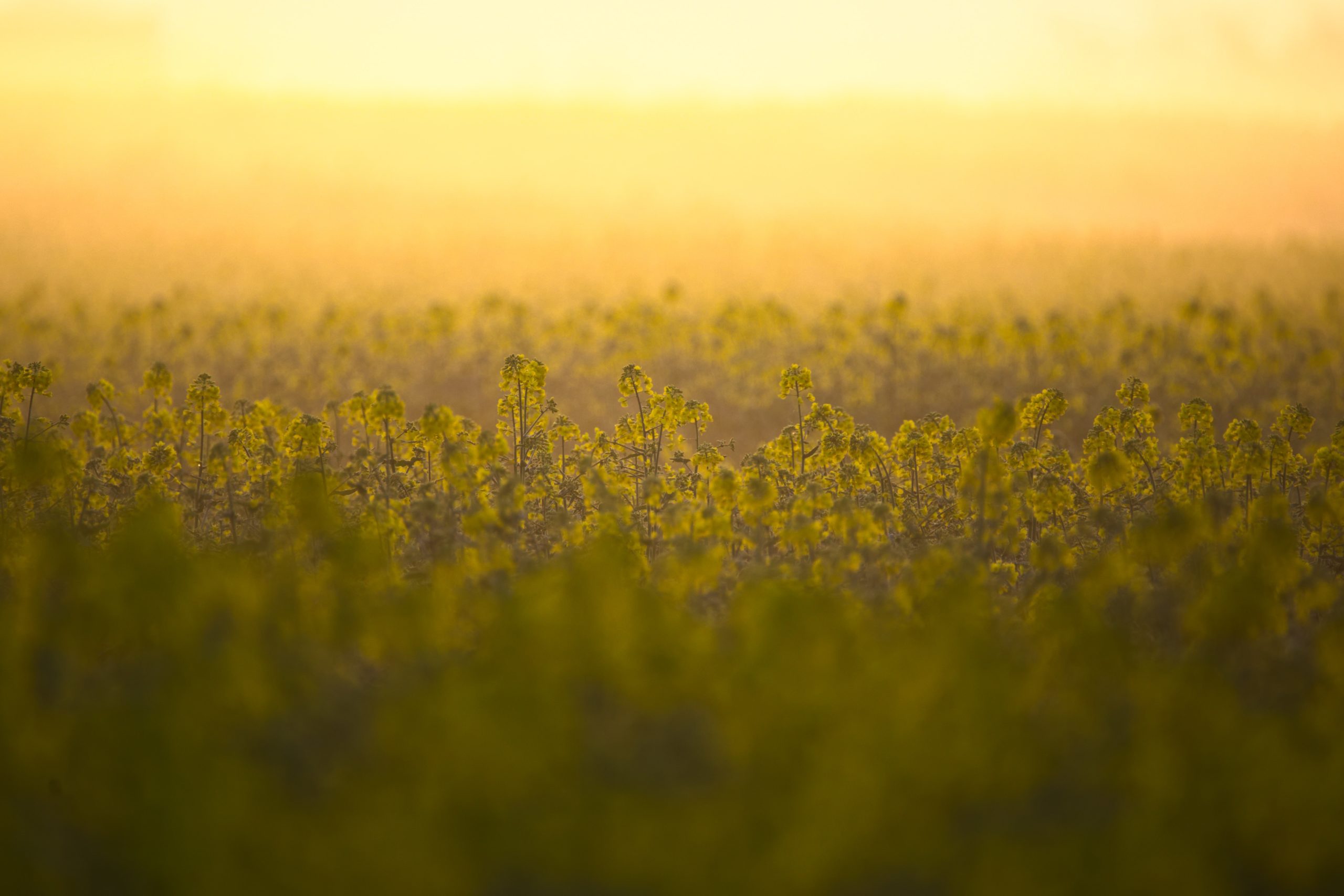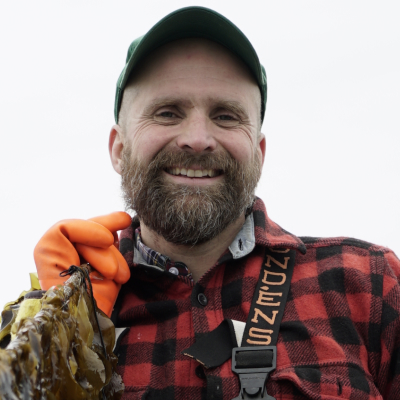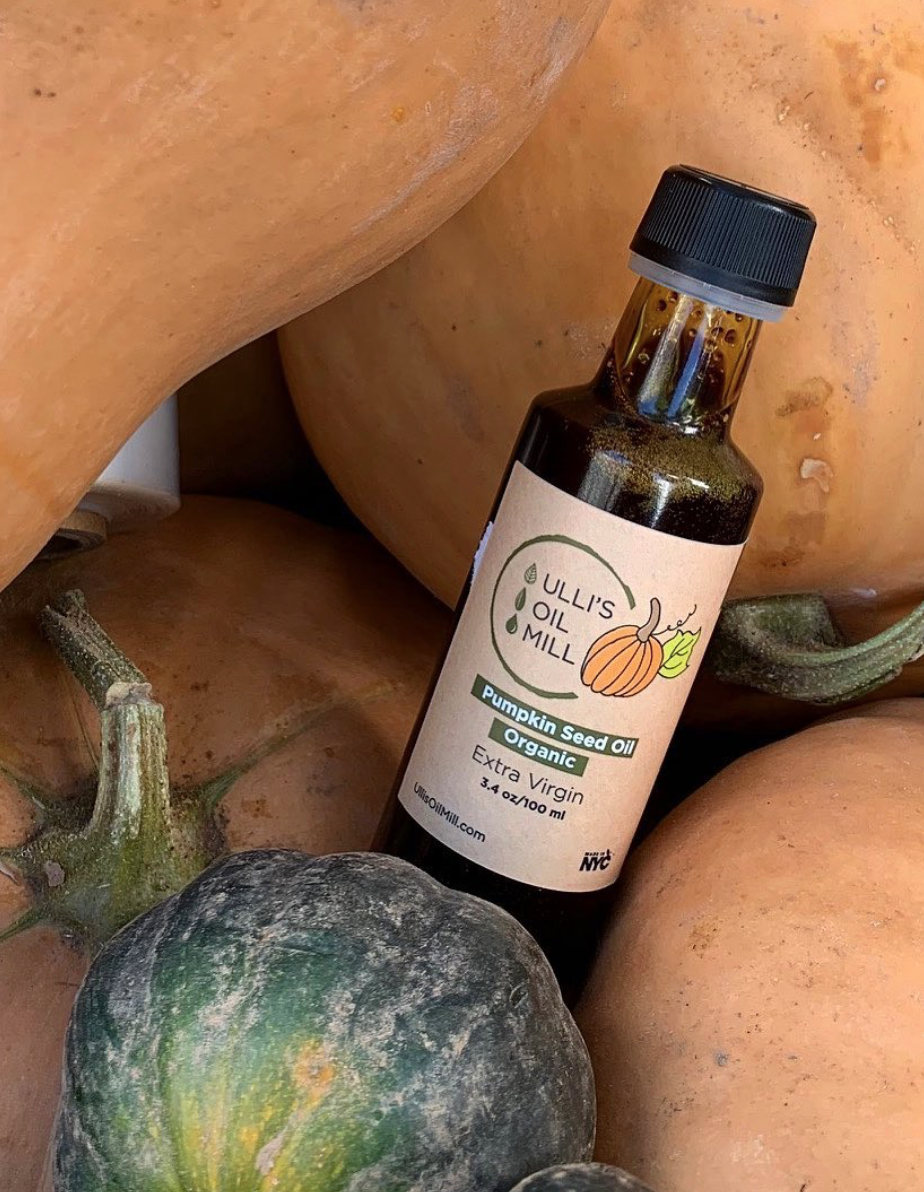
When Ulrike Sitter first settled in the U.S., she searched for the cherished cold-pressed seed oils of her native Austria and came up empty handed. With an emphasis on sustainability and staying local, Sitter sought out farmers in upstate New York who shared her vision for Ulli’s Oil Mill. These award-winning unfiltered, unbleached, and not deodorized oils are stamp pressed in small, on-demand batches in Queens, New York. This allows for better nutrition and taste. Ulli’s offers hemp, pumpkin, sunflower-chili, and rapeseed oil as well as the lesser known delicately earthy camelina. The 4,000-year-old camelina seed oil is considered the oil of the Celts and has the ideal balance of essential fatty acids. All of these highly nutritious oils taste delicious drizzled over salads, soups, yoghurt and more, and can help your skin glow! Ulli also avoids waste by upcycling her leftover press cakes into protein powders. —Jane Ratcliffe
How did you learn so much about oilseeds and farming? Was it introduced to you early in life?
I am from Austria, near Salzburg, and grew up with fresh, seasonal food where fresh pressed oils were part of our daily home-cooked meals. My mother’s family is an old farming family and I have cousins who are still innovative farmers back home in Austria. Two of them founded a pumpkin growing coop.
Growing up I spent a lot of time with my grandfather. He was a very knowledgeable farmer connected to nature. He bred horses, milked his dairy cows, harvested rainbow trout from the pond, competed in pigeon racing, kept bees, had his own smokehouse and crafted his own ciders, blood sausages and sauerkraut. No one spoke of “organic” or “biodynamic farming” yet, but he was “one with nature” and would only take as much as was necessary.
When my husband and I moved to NYC, I also became a mum and regularly bought our food from the Union Square Farmers Market. After witnessing that food culture, I missed the wide variety of fresh pressed oils, especially the pumpkin seed oil. You can find imported oils here in the US, but sometimes they are rancid and at best never as fresh. I eat mainly a plant-based diet, so for me oils and plant-based proteins are an important part of my daily food. I thought why import if you can grow all these oilseeds here. I connected with GROWNYC, took their New Farmers Development class, and had my own little pumpkin test field in Milton, Hudson Valley.
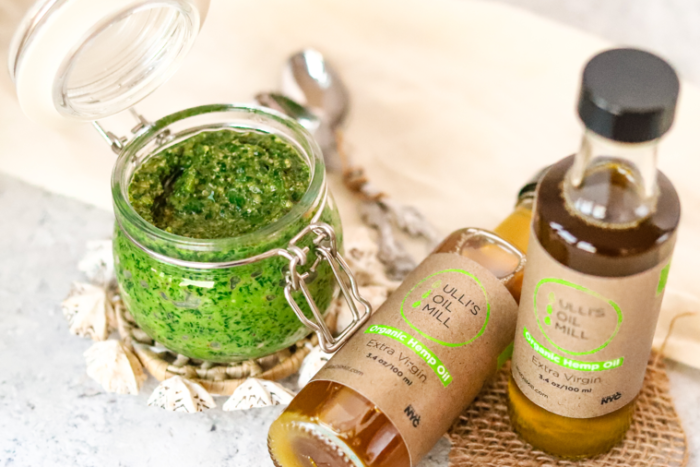
Can you tell us more about the process of stamp pressing oils?
My original idea was to make pumpkin seed oil. Only a stamp press can press pumpkin seed oil as the pumpkin seeds are cut, and salt and water is added. Then that mass gets roasted for over an hour. Afterwards, it is filled into the stamp press. An expeller press could not extract oil out as it does not have enough resistance to press oil from this soft mass.
For more information, please check out the stamp-press graphic and cold-pressed oil blog on my website: https://www.ullisoilmill.com/pages/stamp-press-process
Besides stamp-pressing which is very labor intensive, there are other methods used on a more industrial scale:
- Expeller pressing – This method always generates frictional heat as the seeds are pushed through the screw. While often referred to as cold-pressed, it is hardly ever under 122 degrees Fahrenheit.
- Chemical extraction with solvents – In this method, usually hexane is poured over the oilseed, then evaporated, refined, bleached, deodorized and filtered. This is your typical supermarket oil.
You use clear bottles for your oils. Doesn’t glass have to be dark to prevent oil from going rancid?
The U.S. does have a local olive oil industry in California and it is easy to source 250ml dark bottles. It is more difficult to source 100ml dark bottles in the U.S., so I ask all of my customers to put their oils in a dark, cool place or cold refrigerator, which slows down the aging process and keeps the oil fresh longer.
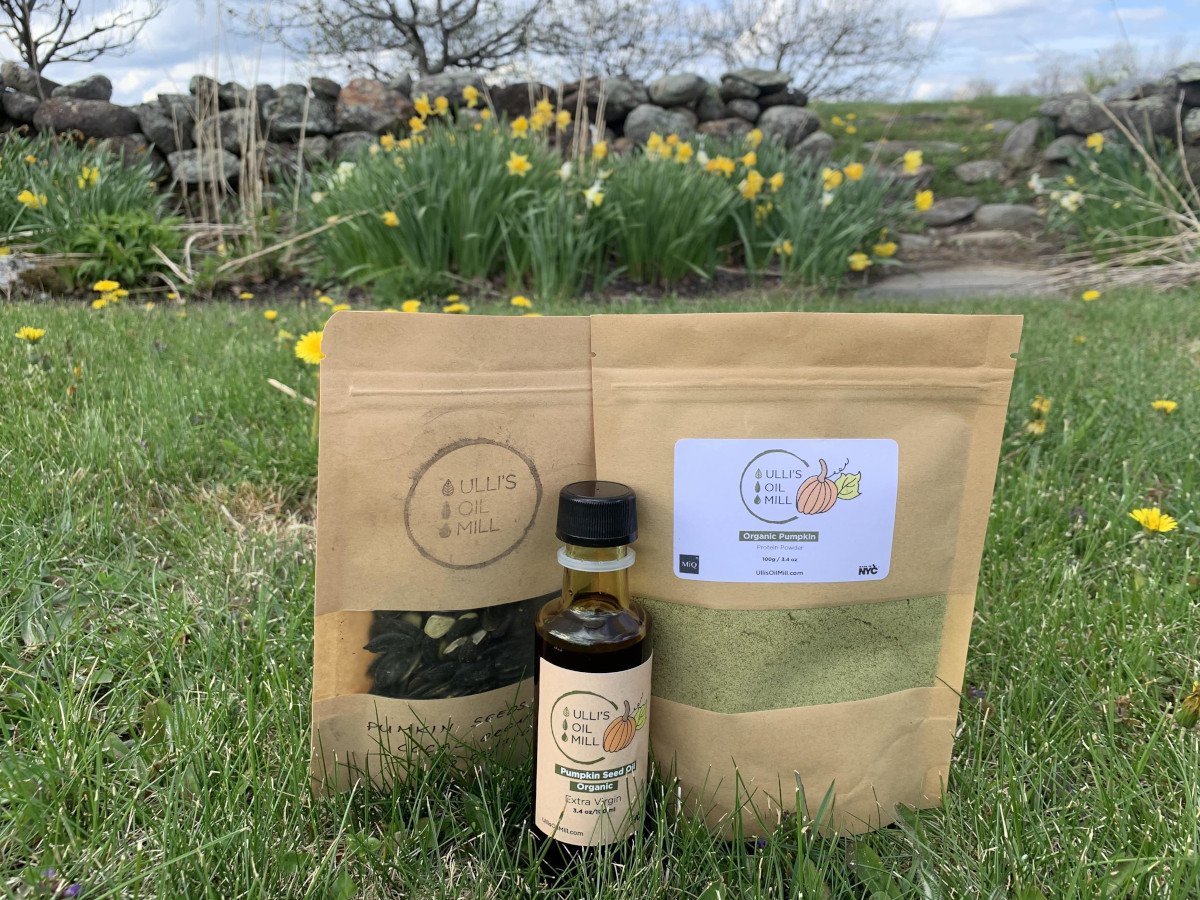
You offer three protein powders upcycled from the leftover press cakes from stamp pressing the seeds. Does this mean there is no waste involved in producing your products?
Correct, it is one cycle. There is no waste to our oil pressing process. The leftover press cake is your clean, plant-based protein. Store bought proteins are bi-products of chemically extracted, industrial grown oil seeds.
Why is it important for oils to be unfiltered, unrefined, unbleached and not deodorized?
We let the oils settle with gravity over the course of 1-2 weeks, depending on the oil. Filtering can eliminate polyphenols and other nutritious parts of the oil. We see our oils as delicious and nutritious finishing oils.
What qualities do you look for in the farms you partner with?
That they take good care of their soil, don’t use any pesticides and truly believe in sustainable farming. I want them to give more back to the soil and environment than what they take. It is also helpful when they are curious and willing to try new approaches.
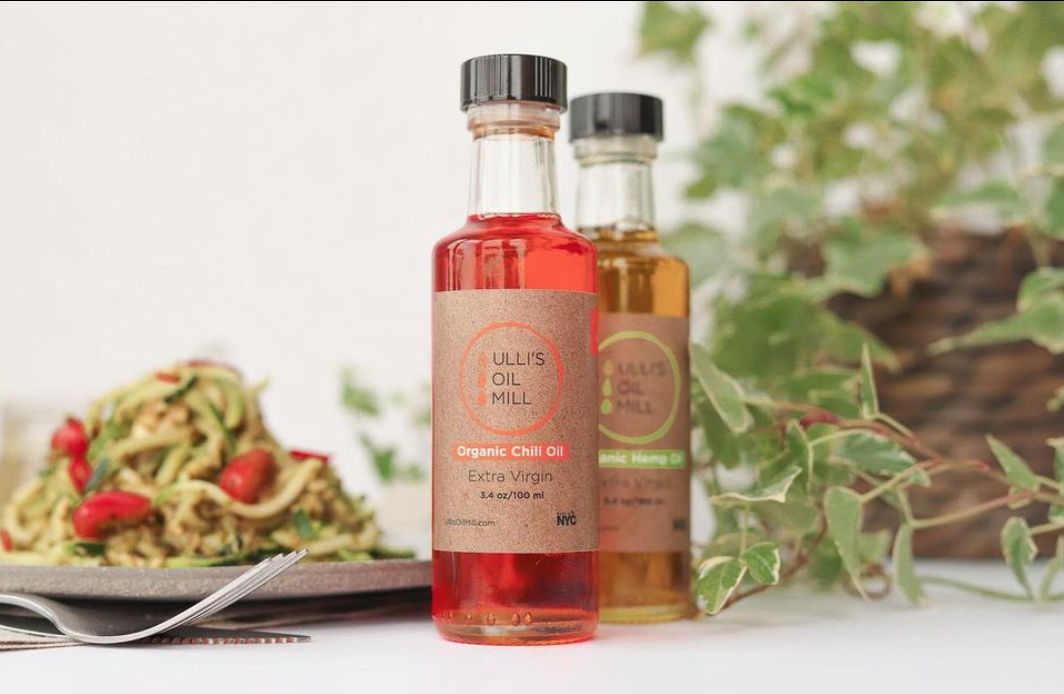
You brought Austrian tradition with you when you moved to the U.S. How do their farming approaches differ?
Thinking in sustainable circles is something embedded in the Austrian lifestyle. Biodynamic agriculture was founded by an Austrian, Rudolf Steiner.
Growing oilseeds as part of a healthy grain crop rotation is not so common in the U.S. The agriculture is either very large scale and monoculture or very small vegetable farmers. There is not so much midsize organic grain farming, but oilseeds can be a cash crop for any farmer. My farmer in the Hudson Valley in New York grows camelina in a mixed crop rotation with summer wheat.
Pumpkins are originally from Central and North America and were brought back to Europe by Columbus. The special Austrian pumpkin is a variety of pumpkin bred for its high-quality oil content. Now I am bringing that famous thick Austrian pumpkin seed oil back to the U.S. and making it a local NY specialty. Fortunately, our hard work is gaining recognition as our pumpkin oil won the Good Food Awards 2020 in San Francisco.
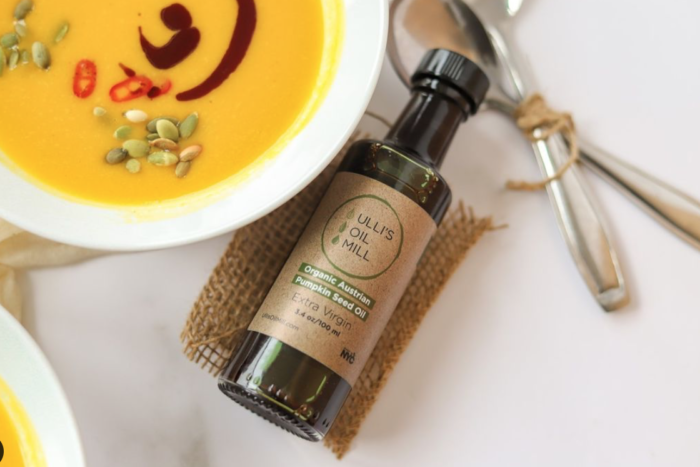
What are some of your favorite uses for Ulli’s Oils?
I love to experiment with all of my oils and proteins. Two or three fresh ingredients with some oil and protein on top is a meal for me. I love to pour camelina oil on plain yoghurt and sprinkle with hemp protein and fresh fruits for breakfast or add it to my gazpacho soup. It brings out the fresh, vegetable taste in any dish.
I also love to substitute some of the white flour in my sweet baking with pumpkin protein. I adore vanilla crescents or pumpkin waffles. The versatility of pumpkin seed oil is amazing—from creamy eggs stirred constantly to perfection in a coated pan drizzled with pumpkin oil (instead of butter or other oil), or in salads or as a topping for risottos, squash soups, and even dips or vanilla ice cream.
I use hemp oil in my salads, and I love the buttery, nutty taste of our raps oil as a substitute to butter in any cream soup. It elevates mashed potatoes and makes a lovely salad dressing oil. The chili oil is great on just about anything to spice up your meal.
